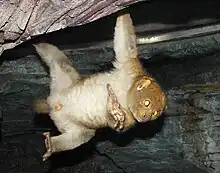| West African potto | |
|---|---|
 | |
| Scientific classification | |
| Domain: | Eukaryota |
| Kingdom: | Animalia |
| Phylum: | Chordata |
| Class: | Mammalia |
| Order: | Primates |
| Suborder: | Strepsirrhini |
| Family: | Lorisidae |
| Genus: | Perodicticus |
| Species: | P. potto |
| Binomial name | |
| Perodicticus potto (Statius Müller, 1766) | |
| Synonyms | |
| |
The West African potto (Perodicticus potto) is a species of nocturnal strepsirrhine primate. It is found in tropical West Africa. It is also known as Bosman's potto, after Willem Bosman, who described the species in 1704. It is the type species of the genus Perodicticus.[2][3]
Taxonomy
This species was formerly considered the only species in the genus Perodicticus, but a 2015 study split it into three species, with only the name Perodicticus potto only applying to the West African population.[4]
Phylogenetic evidence supports the West African potto being the most basal member of the genus Perodicticus, with the other two species being sister species to one another. It is thought to have diverged from the other species during the mid-late Miocene, between 6-10 million years ago.[4]
The mysterious "false potto" (Pseudopotto martini) is now thought to have been a misidentified specimen of West African potto.[3]
Distribution
This species ranges from Guinea west to Nigeria, with an disjunct population in eastern Senegal. The Niger River serves as the eastern barrier to the species' range, separating it from the Central African potto (P. edwardsi).[5]
Ecology
One population of chimpanzees living in Mont Assirik, Senegal, was observed to eat West African pottos, taking them from their sleeping places during the day; however, this behaviour has not been observed in chimps elsewhere.[6]
Conservation
Although this species is known to survive in disturbed forests near human habitation, population growth and subsequent habitat destruction in West Africa are of major risk to the species. Heavy deforestation for industrial agriculture is thought to have led to rapid population declines in the species. In addition, this species is more frequently hunted for bushmeat due to a decline in larger animals to hunt, which has in turn also caused pottos to become rarer. Due to this, it is classified as Near Threatened on the IUCN Red List.[5]
References
- ↑ Svensson, M.; Oates, J.F.; Pimley, E.; Gonedelé Bi, S. (2020). "Perodicticus potto". IUCN Red List of Threatened Species. 2020: e.T91995408A92248699. doi:10.2305/IUCN.UK.2020-2.RLTS.T91995408A92248699.en. Retrieved 20 November 2021.
- ↑ Smeenk, C., L.R. Godfrey & F.L. Williams. The early specimens of the potto Perodicticus potto (Statius Müller, 1776) in the National Museum of Natural History, Leiden, with the selection of a neotype. Zool. Med. Leiden 80-4 (12), 10.xi.2006: 139-164 ISSN 0024-0672.
- 1 2 "Explore the Database". www.mammaldiversity.org. Retrieved 2021-11-08.
- 1 2 Pozzi, Luca; Nekaris, K. Anne-Isola; Perkin, Andrew; Bearder, Simon K.; Pimley, Elizabeth R.; Schulze, Helga; Streicher, Ulrike; Nadler, Tilo; Kitchener, Andrew; Zischler, Hans; Zinner, Dietmar (2015). "Remarkable ancient divergences amongst neglected lorisiform primates". Zoological Journal of the Linnean Society. 175 (3): 661–674. doi:10.1111/zoj.12286. ISSN 1096-3642. PMC 4744660. PMID 26900177.
- 1 2 Oates, John; University), Magdalena Svensson (Oxford Brookes; University), Sery Gonedelé Bi (Felix Houphouet Boigny; Pimley, Elizabeth (2020-01-20). "IUCN Red List of Threatened Species: Perodicticus potto". IUCN Red List of Threatened Species.
- ↑ Chimpanzees in the dry habitats of Mont Assirik, Senegal and Semliki Wildlife Reserve, Uganda' by K. D. Hunt and W. C. McGrew. Chapter from Behavioural Diversity in Chimpanzees and Bonobos, edited by Christophe Boesch (Cambridge University Press, 2002)
